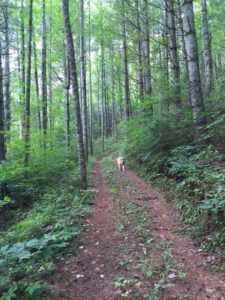
In her brilliant book, “Psychic Energy,” Jungian analyst M. Esther Harding writes: “When life presents us with a new problem, a new chapter of experience for which the old adaptation is inadequate, it is usual to experience a withdrawal of the libido. For one phase of life has come to an end, and that which is needed for the new is not immediately at hand. This withdrawal will be experienced in consciousness as a feeling of emptiness, often of depression, and certainly of inertia, with an overtone of self-rebuke because of what seems like laziness or sloth.”
Have you ever been there? I have. Many times. And each time it happens it takes a while before I remember that this is simply another step in the journey. The road may be leading downhill for now, but it’s still there, and as long as I can place one foot in front of the other the story isn’t over yet. But what are we to do while we’re in the abyss of emptiness? The depths of depression? The islands of inertia? The swamps of self-rebuke?
First of all, we need to remember that when our libido, or psychological energy, withdraws, it is not gone forever. The laws of physics tell us that energy can be transformed but not destroyed. When we feel a loss of energy it simply means that the energy which was formerly available to our ego has sunk into the unconscious. Once it gets there, forces over which our egos have no control will have to be mobilized before the energy can return to consciousness. The ego usually feels to blame, but it is not, because it has no control over unconscious forces.
Second, in the words of Harding, “When the light of life dims and one is left in the darkness of depression, it is much more effective to turn for the moment from the objective task and to concentrate attention on what is going forward within, instead of forcing oneself to continue by a compulsive effort of the will.” Once the libido is no longer available to our ego, will power can only be used effectively to “follow the lost energy into the hidden places of the psyche by means of creative introversion.”
Creative introversion means working with our fantasies and dreams in creative ways that feel meaningful. These products of our unconscious speak to the hidden forces which have sucked our libido down into the dark belly of the whale, and their images can give us clues not only to the nature of the difficulty, but also to the solution.
For example, many years ago toward the end of an extended period of libido loss I kept imagining myself as a baby chick still inside an egg, pecking at the shell. I knew I felt trapped, but I didn’t know what was trapping me or how to get out. Exploring this and other waking and dreaming images through art and journaling highlighted features of my persona that had initially protected the new life in me but were beginning to smother it. As I kept pecking away, cracks appeared in my shell until it finally collapsed and I stepped out of my self-imposed prison. The extraordinary infusion of new life I’ve experienced since then has taught me to see libido loss and depression not as obstacles or enemies, but as helpful guides along the way.
My thanks to Dr. Judith Rich for the inspiration for this post. Check out her latest article on the Huffington Post to see her wonderful take on a related topic. Welcome back, Judith.

A Lesson on Aging
I’m so happy to be back in the mountains. I love the weather, the trees, the birds, the rushing creek, the flowering bushes. The beauty.





0 Responses
So much wonderfulness here, Jean. Thank you for sharing your experiences with the depths, the islands, and the swamps…The key for me is right at the beginning when you say, “as long as I can place one foot in front of the other…” When I am in that place of inertia, and the swamps are trying to suck me in, “moving-a-muscle-and-changing-a-thought,” has been a life saver—literally (not the candy, literally, although that would make things a lot simpler :))—even if it’s just moving across the room—anything to break the trance of the depression—I have found it takes enormous effort sometimes to begin moving, but that it only takes a short distance to rise up and find solid ground again. Thank goodness for people like you and my other fellow travelers who go before and leave ropes and things to grab hold of. It makes the swamps a lot easier to get out of, and for me, it’s those swamps of “self rebuke” that are often the hardest things to get out of. But your reminder that when the libido is sunk down that it is simply transforming, is wonderful. I am so conditioned to judge things as good or bad (esp. bad). When I was moving through the pain of old abuse memories I remember crying for days, weeks…and then one day I’d wake up and the tears would be gone and I’d instantly fall into a swamp and think something was wrong! “Why did I stop crying? I know I’m not through this yet! What am I doing wrong? What am I suppressing?” Those are some of the vines the swamp would send up to grab hold of my ankles…Now I know that my soul is wise and when it needs a break, it takes one—there is no need to blame and no need to judge it—just let the tears stop if they need to, or let them come if they need to. The soul is always transforming something—that’s what all artists and alchemists do!
And I so love and admire the “creative introversion” idea—I call it creative visualization, but sometimes I simply call it play. And for me, the physical act of movement whether it be walking, singing, anything healthy combined with creative introversion is key. They go hand-in-hand for me most of the time. Sure sometimes I find a still, quiet place and go within to dream and revel in those inner fields of gold, but in my story, I spent so long living against my body, denying and shaming my body because of the abuse, that, at least for now, the part of the journey I am on is to get the body positively involved most of the time.
I’ll close with a little story about a creative introversion I did without knowing what I was doing—it just came to me…One of the effects of my abuse was PTSD…which often manifested in frightening images zooming through my head…One day, I sat down and imagined myself inviting all of those images into my house—the invaders, the violent ones, the monsters…and I simply talked with them and asked them what they needed. We had a wonderful talk. Then I ordered them a pizza—really! That was part of the visualization—it totally lightened it up!
To sum up—it’s all good—I am learning, like you, to welcome every experience as a messenger, an angel, listen to it, bless it, and then keep moving. And baby chicks rule in the cuteness department!
So thank you again for sharing. Your post means a lot to me. I hope you don’t mind such long responses, but you’re just so inspiring! 🙂
Dear Joseph,
This is such a beautiful, heartfelt response. I especially love, “Now I know that my soul is wise and when it needs a break, it takes one—there is no need to blame and no need to judge it—just let the tears stop if they need to, or let them come if they need to. The soul is always transforming something—that’s what all artists and alchemists do!” This insight comes from a depth of experience that has provided much hard-won wisdom: the authentic kind that lasts.
Play was one of Carl Jung’s favorite forms of creative introversion, and he had a name for what you did when you invited your frightening images into your conscious awareness. He called it active imagination. This is a deceptively simple, but profoundlly effective solution for dealing with the products of the unconscious which call out to our egos to free them from their prison of repression. Following your intuition as you did to recognize your “demons,” interact with them, and befriend them was the best thing you could have done for yourself because taking your soul’s truths seriously and honoring them with your full attention is how you heal yourself. Bravo!!
Please don’t worry about the length of your response. Your words, wisdom and heart are an inspiration to all who are committed to the inward journey. Thank you for blessing me with your comments.
My blessings to you,
Jeanie
Jeanie,
As they say, “With age comes wisdom.” Years ago, when I was suffering through bouts of depression, I had a tendency to beat myself up about it. “What’s wrong with me?” was my mantra. With time and age I began to recognize the cycles, the ebb and flow of life. Now I sit in that moment, experience it, and let whatever I’m feeling surface. I find it is often the confluence point where feelings, emotions and ideas come together to create some of my most creative writing. I look at those moments as opportunities and a calling for a better understanding of myself.
My compliments to Joseph Anthony on his thoughtful comment above. Well said.
Another wonderful piece, Jeanie.
Charlie
Charlie,
I really enjoy hearing how you and Joseph have learned to listen to yourselves and take whatever comes up seriously. This is such a critical step to our well-being. As Joseph learned, it’s how we heal ourselves, and as you discovered, it’s also how we release our creativity. The surest way to kill the life of our souls is to beat up on ourselves and follow the conventional “tough guy” wisdom of using our will power to “get a grip,” “shape up,” and otherwise press on while ignoring authentic feeling.
In Jungian terms, to disown authentic feeling is to disown our anima, or unconscious feminine sides. We see the terrible consequences of doing so every day on the news! My compliments to both of you for being part of the solution.
Blessings,
Jeanie
“Tough guy” resonates, Jeanie. Somewhere along the way, at least with the boys I knew, a tacit agreement developed between fathers and sons that this was the way we operate effectively in the world. Ugh.
I know. This attitude is particularly powerful in the military and athletics, where, of course, toughness is necessary. Unfortunately it tends to translate into other endeavors, like relationships, where it becomes toxic and corrosive. The challenge for men and women alike is to see the positive and negatives sides of pairs like “tough and tender,” “hard and soft,” and “firm and vulnerable” and know when each is appropriate!